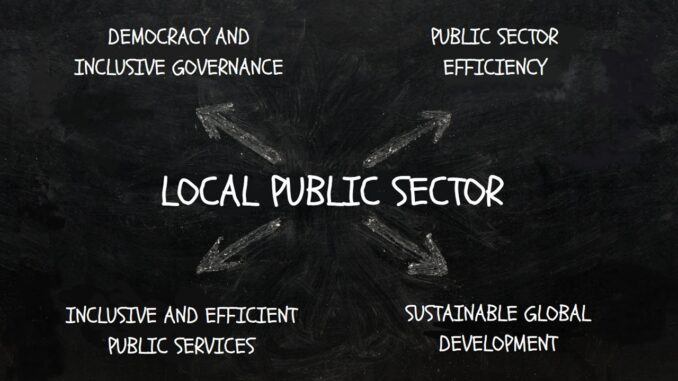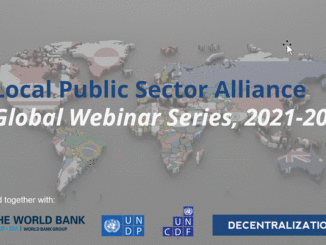
Some organizations have an easier job than others explaining what they do and why what they do is important. For instance, the communications team at ‘Save the Children’ (hopefully) does not have to spend a lot of time explaining what their organization does or why their cause is important.
Unfortunately, the Local Public Sector Alliance is not in the same position. Our mission recognizes the world’s problems as complex and its solutions as far from linear. In fact, few people may even know what the local public sector is, or why it is important.
As such, our niche does not to solve any one of society’s grand challenges—whether it is saving children, fighting disease, alleviating poverty, or combating climate change—but rather, recognizes that there are common obstacles within the public sector that contribute to all of these global challenges.
The complex role that the local public sector and multilevel governance play means that the Local Public Sector Alliance don’t necessarily have one target audience that needs to understand that the local public sector is critically important. Instead, the local public sector is important for (at least) four different reasons, and for four different audiences.
1. Do you care about democracy and inclusive governance?
In most countries, inclusive and participatory governance is only meaningfully possible at the local government level. Central government officials are often simply too far away for citizens to engage with them directly, to meaningfully participate in planning processes, or to hold officials accountable for their performance. This is very different at the local level, where citizens are able to engage directly with the local officials that are responsible for preparing local plans and delivering local services.
With attention disproportionately directed toward the national political arena, the role of democratically elected regional and local governments in achieving an inclusive and responsive public sector is easily overlooked. Yet, in democratic countries with an inclusive and responsive multilevel public sector, the vast majority of elected officials —in many cases, more than 90% of all elected officials—are elected representatives at the local government level. At the local level, citizens are able to participate in local decision-making and elected officials are able to ensure that the needs and priorities of their constituents are met by local governments in a way that is simply not possible at the central level. In fact, it is fair to say that there is no real democracy without local democracy.
If you care about democracy and inclusive governance are important, you should really care about the local public sector.
2. Do you care about public sector efficiency?
The goal of public financial management is to improve citizens’ lives by effectively managing public resources. This requires that the public sector uses resources efficiently, by allocating public funds for their highest-value purpose and by distributing resources to the places where they are needed the most. Unsurprisingly, well-functioning public sectors typically spend a large share of their public resources at the local level, where public funding is transformed into frontline services.
Although ensuring technical and allocative efficiency is widely recognized as one of the key objectives of public financial management systems, most traditional PFM tools do a poor job capturing the vertical or intergovernmental aspects of public resource allocations. As a result, many countries are unable to answer the most basic questions about the technical and allocative efficiency of public sector finances, such as: within each sector, what share of public resources get stuck in the central bureaucracy versus the share of funds that flows to the local public sector, where funding is transformed into frontline services? How are public funds distributed across the national territory? Are they distributed to the places where needs are highest? How efficiently are funding inputs being transformed into public sector outputs and outcomes? What is the value-for-money that taxpayers receive from government services at different levels?
None of these questions can be answered properly unless public finances are considered holistically across all government levels, including the local public sector. In practice, however, most PFM assessments focus heavily on central government spending and the effectiveness of the central fiscus in exercising treasury control, rather than on interrogating the technical and allocative efficiency of local public sector spending across the national territory. As such, it is critical to work together to recognize—and address—the blind spot that current PFM assessments tools have with respect to local public sector finances.
If you care about public sector efficiency, you should really care about the local public sector.
3. Do you care about inclusive and efficient public services?
In countries around the world, most of the pro-poor public services that have a direct impact on people’s lives—education, primary health services, access to clean water, streetlighting, and so on—are delivered at the local level.
Public services such as education, primary health services, and clean drinking water are fundamental to human well-being, directly impacting factors like life expectancy, economic productivity, and poverty reduction. More often than not, however, ineffective multilevel governance systems form an obstacle to the efficient delivery of public services.
Improve the effectiveness of multilevel governance and the local public sector enables a more responsive and effective delivery of services by allowing for decision-making and policy implementation to occur at the most appropriate level, considering local needs and circumstances, while still maintaining coordination between different tiers of government, ultimately leading to better citizen engagement and improved public service outcomes.
If you care about inclusive and efficient public services, you should really care about the local public sector.
4. Do you care about inclusive and sustainable global development?
The global challenges that countries face in the 21st century cannot be dealt with by any single government level alone. These challenges include not only improving access to public services such as education, health, or water, but also ensuring inclusive access to jobs and economic opportunity; responding to pandemics; channeling urban development; reducing gender inequity and social exclusion; preventing or mitigating the impact of climate change and environmental disasters; or counteracting political polarization and the rising threat of authoritarianism.
The scale of these challenges is so overwhelming that stakeholders at all levels of government and society need to work together to collectively solve these challenges. While the local public sector—as the part of the public sector closest to the people—is well-positioned to help address these challenges, their potential role is often completely overlooked by central government decision-makers and global development actors alike.
In some countries, the excessive centralization of power and resources within the public sector is making it difficult to unlock the ability of the local public sector to act as a catalyst for inclusive and sustainable global development. In these countries, the weakness of local government institutions and ineffective multilevel governance systems forms an important binding constraint to the ability of the public sector to deliver inclusive, equitable public services and to promote sustainable development. Especially in these cases, strengthening the local public sector and improving the effectiveness of multilevel governance systems should be seen as an opportunity to promote resilient, inclusive, and sustainable development.
Without an inclusive and responsive local public sector, it is unlike that any country will be able to make sustainable gains on the grand global development challenges being faced.
If you care about inclusive and sustainable global development, you should really care about the local public sector.
Concluding thoughts
Even though the local public sector is a complex concept that is not necessarily easy to explain, it is hard to overstate its significance.
The local public sector is the cornerstone of inclusive and participatory governance, ensuring that democracy thrives not only at the national level but in the very communities where people live. By enhancing public sector efficiency and effectively managing resources, it drives the delivery of crucial services that directly impact lives. Moreover, the local public sector plays a pivotal role in tackling the multifaceted challenges of global development, working in concert with all levels of government to create resilient, inclusive, and sustainable societies. As such, recognizing and strengthening the local public sector is essential for achieving a holistic, effective, and accountable governance system that meets the needs of all citizens.
If we care about democracy, efficiency, public service inclusivity, and sustainable development, then we must indeed care deeply about the local public sector.
This article was written by Jamie Boex and posted on Decentralization.Net on November 27, 2024. Jamie Boex is the Executive Director of the Local Public Sector Alliance (LPSA).



